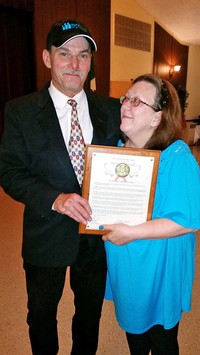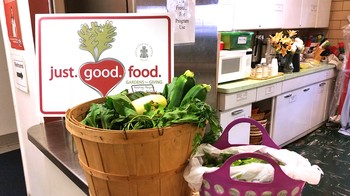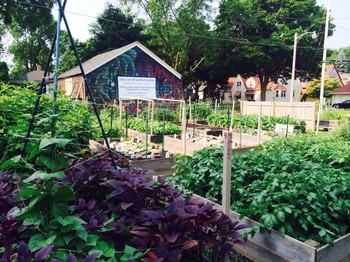“Once you open the door of possibility things happen,” says the Rev. Karen Hagen, pastor of Tippecanoe Presbyterian Church in Milwaukee, Wisconsin. Things really began to happen for this 51-member congregation when they decided to open their church doors in response to the needs of homeless persons in the Bay View area of their city.
After noticing an increase in the number of homeless individuals around their churches, and realizing members of their congregation were on the verge of becoming homeless, several churches came together and began exploring viable intervention options. They knew something had to be done.
Their original vision was to create a rotating shelter, “but one of the city jurisdictions closed the door in our face and they closed it pretty hard,” says Hagen. “It was pretty disdaining because of the way they closed them. They told us we couldn’t have a shelter in our church.”
So the church responded by opening its doors for prayer vigils—overnight prayer vigils, creating the only Southside warming room in Milwaukee. Their prayers gave birth to the Divine Intervention ministry—a ministry that has received the Outstanding Urban Ministry Award of the Greater Milwaukee Interfaith Conference.

Larry receiving the Molina Healthcare Volunteers of the Year Award, with his wife Nancy at his side. Formerly homeless, and Divine Intervention guest, Larry began the Larry Under The Bridge ministry serving local campers. —Photo provided
From that initial emergency overnight warming room in 2010, Divine Intervention has grown into a year round ministry providing for basic needs to homeless adult men and women within Milwaukee County with special attention to Milwaukee’s Southside community. “We are a partner in the Continuum of Care in Milwaukee and work intimately with the Milwaukee Police Hot Team and Social Services,” says Hagen.
The Outreach and Justice Ministry of Tippecanoe Presbyterian Church hosts the intra-faith ministry that includes more than 46 faith communities. “Our primary mission is to provide 20 plus nightly homeless guests their basic human right of a safe place to warm overnight,” says Hagen.
When asked why they refer to the individuals receiving service as guests, Hagen explains, “Divine Intervention recognizes that the words we use influence the outcome of our relationships. We therefore refer to the homeless [persons] we serve as our ‘guests,’ volunteers are referred to as ‘hosts’ and/or ‘staff.’ These titles set the foundation for an organizational culture of gratitude and respect.”
The ministry is comprised of five distinct yet interwoven programs. The overnight prayer vigil/warming room; Friday night SOS (Sharing Our Suppers) meals; Larry Under The Bridge; Graced Saturday Mornings and Garden Keepers, which offers the ministries most successful guests a garden internship as workforce development.
Each of the five programs has a food component. “We recognize that food is not only essential for nutrition and a life source, but serves as a gateway to reconnecting those who are homeless back into society through relationship,” says Hagen. “Therefore, dinners are served family style where guests and hosts and servers eat together and practice being part of a community.”
Hagen says the Garden Keepers program was so well received it will expand in 2016. “The garden interns raised, harvested and gave away 1500 pounds of organic vegetables through a new nutrition education arm of the ministry disguised as cooking demonstrations, taste testing and recipe giveaways with a local food pantry,” she says.

Setting up the garden bounty for a nutrition cooking demonstration and veggie give away at BayView Community Center's Pantry program. —Photo provided
Volunteers and guests alike are essential to the success of the programs. Ninety trained volunteers commit to one overnight shift each month for four consecutive months to staff the prayer vigil/warming room. Hagen provides guidance, supervision and pastoral care on a daily basis. Guests are required to participate by carrying out chores that serve to support the programs, like washing dishes after dinner, shoveling the sidewalk, general care of the building, helping new guests adjust, etc. “This engagement in the life of the community often initiates a journey to wellness,” says Hagen.
Divine Intervention ministry’s markers of success read as those of a ministry that has existed much longer than five years. Each year the ministry places a significant number of guests into transitional housing through community partners; 38 guests were placed through the ministry’s partners into programs or supportive living this the year ending Nov. 30. During this past year, they grew from 39 to 46 faith community partners. And volunteers come back year after year, deepening their involvement and bringing others with them for 2014-15 there were 1500 volunteer contacts.
When asked what makes the program unique, Hagen quickly replies, “Our mission of ‘respecting the dignity of all God’s adult children’ guides everything we do. Beyond safe sanctuary and the provision for basic needs, the prayer vigils/warming room creates community… one which gives an opportunity for our guests to re-engage in the community through self-awareness and relationship; prompting supported personal development.

